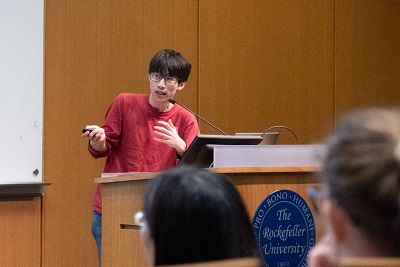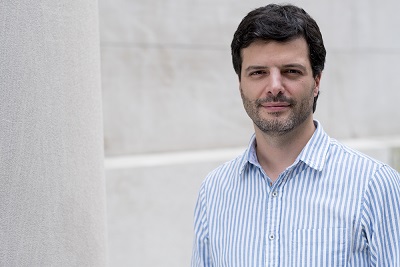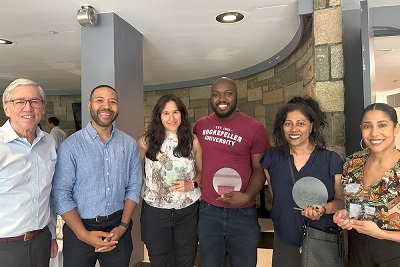President Emeritus Frederick Seitz dies at 96
Frederick Seitz, president emeritus of The Rockefeller University and a former president of the National Academy of Sciences, died Sunday, March 2 in New York. He was 96.
A distinguished physicist and educator who held key government posts for over three decades, Seitz received the National Medal of Science, the nation’s highest award in science, in 1973 for his contributions to the modern quantum theory of the solid state of matter.
Seitz was born in San Francisco, California, on July 4, 1911. He received his A.B. in mathematics from Stanford University in 1932 and his Ph.D. in physics from Princeton University in 1934. While at Princeton, he and his teacher, Eugene P. Wigner, developed the Wigner-Seitz method for calculating the cohesive energy of a metal, the first such calculation, based on the known properties of the atoms involved. He served on the faculties of the University of Rochester, the University of Pennsylvania, the University of Illinois and the Carnegie Institute of Technology (now Carnegie-Mellon University), and he was a research physicist at the General Electric Laboratories before being appointed president of The Rockefeller University in 1968.
Under his administration, new basic research programs were started in reproductive biology, cell biology, molecular biology and the neurosciences as well as new clinical investigations at the university’s research hospital. The university also began a joint M.D.-Ph.D. program with Cornell University Medical College, and established the 1,000-acre Center for Field Research in Ethology and Ecology in Millbrook, New York, where behavioral and biological scientists study a wide range of natural phenomena related to animal behavior and environmental biology.
During Seitz’s decade-long tenure, seven endowed professorships were launched, the university completed construction of several critically important buildings and the Rockefeller Archive Center in Pocantico, New York was established. Seitz also played a major role in launching the first development program in the institution’s history.
Elected to the National Academy of Sciences in 1951, Seitz served as president on a part-time basis for three years before assuming full-time responsibilities in 1965. Among his numerous honors and awards, Seitz received the Franklin Medal in 1965; Stanford University’s Herbert Hoover Medal in 1968; the United States Department of Defense Distinguished Service Award in 1968; the National Aeronautics and Space Administration’s Distinguished Public Service Award in 1969 and 1979; the Compton Award, the highest award of the American Institute of Physics, in 1970; and the James Madison Medal of Princeton University in 1978. Rockefeller University awarded him an honorary doctor of science degree in 1981 and the David Rockefeller Award for Extraordinary Service to The Rockefeller University in 2000. In addition to Rockefeller, 31 universities in the United States and abroad awarded him honorary degrees.
Seitz was a member of numerous scientific organizations, including the American Physical Society (president, 1961), the American Academy of Arts and Sciences, the American Philosophical Society, the American Society for Metals, the American Institute of Mining, Metallurgy and Petroleum Engineers, the American Crystallographic Society, the Optical Society of America, the Washington Academy of Science and a number of European scientific academies. From 1978 to 1983 he served as vice chairman of the board of trustees of the Memorial Sloan-Kettering Cancer Center.
Among numerous books he authored is The Modern Theory of Solids, which is generally regarded as having been a prime influence in the development of solid-state physics, including the development of transistors. He was an editor and consultant to numerous scientific publications, including the second Five-year Outlook on Science and Technologyfor the National Academy of Sciences, and was a consulting editor in solid-state physics for the Encyclopedia of Science and Technology.
Seitz is survived by his son, Joachim Seitz, of Palo Alto, California, three grandchildren and four great-grandchildren. His wife, Elizabeth Seitz, died in 1992.


